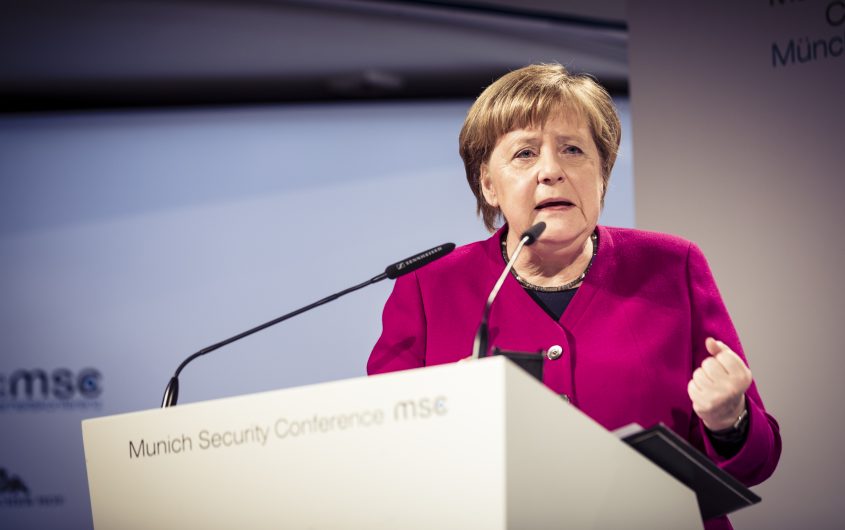
Dazed and Confused: Germany’s Inner Struggle to Mature

Aylin Matlé
German Council on Foreign Relations
Aylin Matlé is a senior research fellow in the Center for Security and Defense at DGAP. Previously, she has served as the Deputy Head of the Konrad-Adenauer-Stiftung’s Israel office in Jerusalem.
Aylin Matlé holds a PhD from Martin-Luther-Universität Halle-Wittenberg. Her thesis “Drifting Apart of Transatlantic Security: The American Mark on NATO under Barack Obama” examined the impact of the Obama administration on allied and defense policies of European Alliance members. Dr. Matlé worked as a research associate at the chair of international relations and European politics at the Martin-Luther-Universität from 2014-2016. Prior to that, she completed an MA in War Studies at King’s College London in 2014. She holds a bachelor’s degree in Public Management and Governance from Zeppelin Universität, Friedrichshafen.
She was a Fellow in the American-German Situation Room in 2018. In addition, she participated in the AICGS project “A German-American Dialogue of the Next Generation: Global Responsibility, Joint Engagement” from 2018-2019.
This year’s Munich Security Conference (MSC) once again illustrated the stark contrast in world views on matters of international security and defense. While it was to be expected that Western countries would not put on a show of unity with revanchist powers such as Russia and China, the discord in transatlantic relations—exemplified in Chancellor Angela Merkel championing multilateralism as an antidote to world problems vs. Vice President Mike Pence reiterating his boss’s “America First” slogan—should give reason for pause. The Trump administration is continuously and increasingly questioning what in retrospect seems like a 70-year Atlantic honeymoon. But just because American and European transatlanticists have grown accustomed to Trump’s transactional attitude toward NATO does not justify accepting or, even worse, becoming complacent about the current state of disharmony in transatlantic relations.
If they want to overcome transatlantic disagreement and convince the Trump administration of the unabated value of NATO to U.S. security and defense, Europeans first have to get their house in order.
If they want to overcome transatlantic disagreement and convince the Trump administration of the unabated value of NATO to U.S. security and defense, Europeans first have to get their house in order. This applies most importantly to Germany. It borders on schizophrenia that five years into the “Munich consensus,” i.e., Germany’s self-proclaimed commitment to an increased role in international security, one of the nation’s leading TV hosts would go on air to debate “The new world disorder – Does Germany have to assume more responsibility?” with her guests on the day the 2019 MSC ended. To outsiders the question might indeed seem strange given that Germany’s top decision-makers determined in 2014 that the world was in disarray and committed the country to do more about it, but upon closer examination, the talk show’s topic reflects a typical German attitude. The country has recognized that it can no longer shy away from maturing into a serious security and defense provider for itself and its allies.
Germany still does not feel comfortable with its (newly) self-ascribed role.
While it has come a long way since 2014, Germany still does not feel comfortable with its (newly) self-ascribed role. This inner rift was reflected in the speeches delivered by German defense minister Ursula von der Leyen, foreign minister Heiko Maas, and Chancellor Merkel: they offered an insight into diverging approaches to defining Berlin’s role in Europe and the world at large. Opening this year’s MSC as the conference’s host, von der Leyen underlined that the world is witnessing a great power competition once again, thereby falling in line with the U.S.’ assessment in the 2017 National Security Strategy. Drawing on the U.S. analysis, the defense minister asserted that Germany had finally arrived at a similar conclusion. While she did not call for a unilateralist response as Pence did, von der Leyen clearly subscribed to Washington’s view on the dynamics shaping international security today. Though Heiko Maas, her cabinet colleague, also conceded that geopolitical rivalries are back on the world stage, his was a different inference. In contrast to the defense minister, Maas placed an unmistakable emphasis on multilateralism—first and foremost the strengthening of the European Union—as a panacea to deal with today’s security confrontations, including the very challenge to the world order itself. In comparison, the German defense minister primarily tasked NATO with defending transatlantic security (though she did not discount the supporting role the EU could assume in bolstering NATO). Merkel, as usual, maneuvered herself somewhere in-between her two ministers. Despite the well-deserved praise for an unusual rhetorical tour de force, the content of her speech did not match the form.
Putting all three statements into juxtaposition, one understands why five years after the “Munich consensus” was announced, German debates about how the country should react to a world in disarray continue: because the country is still dazed and confused about whether it wants to play a more pronounced role in world affairs. While the country’s leadership would presumably answer the question in the affirmative (in contrast to the wider public), decision-makers are not yet in sync when it comes to deriving means and strategies to undergird Germany’s (self-)elevated role in European and transatlantic security.








